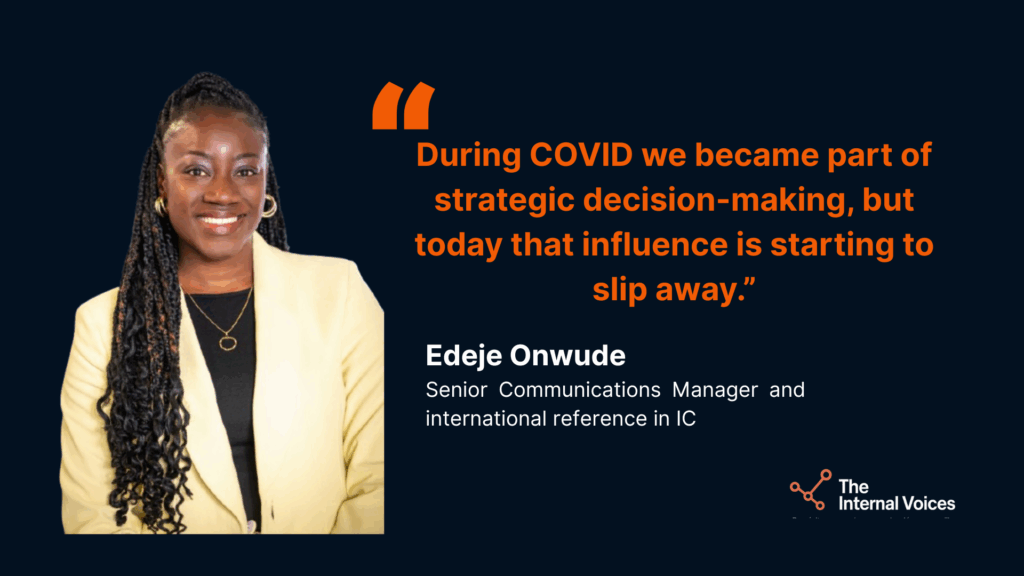Edeje Onwude: The risk of moving backwards in Internal Communications after the lessons of COVID

- trinimaturana
- The Voices in English, Voces de la Industria
Índice
The conversation with Edeje Onwude was so rich in perspectives and challenges that we decided to divide it into two parts. This is the first, focused on what internal communications gained during the pandemic and the risk of losing it again. In the second part, coming in the next few days, we will explore her vision on Artificial Intelligence, the role of academia, and the profile of future professionals in this field.
Edeje is a skilled communications professional with 15 years of global internal, brand communications experience at companies like Coca-Cola and Reckitt. Now focused on Internal communications, employee engagement and organisational change. She’s an expert in storytelling, cultural insight, and purposeful communication. Born in Nigeria and based in the UK, Edeje is driven by a desire to shape culture and align people with purpose.
Edeje Onwude: “During COVID we became part of strategic decision-making, but today that influence is starting to slip away”
At The Internal Voices, we know that the voices that move our discipline are not always comfortable. Some are meant to challenge. And Edeje Onwude, an emerging voice in Internal Communications, is one of them.
In this Part 1 of our conversation, she shared that the COVID pandemic reinforced the strategic value of Internal Communications, positioning teams as advisors in critical decisions. Today, however, that hard-won role is under threat.”
“During COVID, internal comms really stepped into strategy… organizations needed us, they empowered us, and we did fantastic work. But after the crisis, that empowerment started to go away, and we’re seeing that value erode.”
From vanity metrics to behaviour and culture change.
Edeje puts it strongly and with confidence. Many internal comms teams are still trapped in, measuring vanity metrics like clicks and open rates instead of cultural and behavioural impact. The pandemic forced a shift in focus. What mattered was not the open rate of an email, but whether employees understood how the organization was going to take care of them and guide them through uncertainty.
That moment, when leadership relied on Internal Communications to sustain culture, trust and continuity, was proof of what the discipline can achieve when its strategic role is recognized.
But today, she says, we are at risk of going back to where we were. Producers of pieces, reporters of superficial metrics, decorators of messages. And that, in her words, is a missed opportunity.
Listening for real, not covering up the noise
Beyond channels and formats, Edeje insists that true listening is the ground on which internal comms earns legitimacy. Listening not only with surveys or townhalls, but with the intention of translating that voice into visible decisions.
Her provocative point is that many IC teams still confuse volume with value: more campaigns, more newsletters, more posts. But the real power lies in turning every interaction into cultural learning, in reading what is not said, and in translating it into strategic change.
Today’s challenge: not to go backwards
The interview leaves one thing clear. What was achieved during COVID was a demonstration of strength, not a definitive victory. The real challenge is not letting that recognition fade now that the crisis has passed.
“We had the spotlight. We had the strategy. And now, we’re losing it because we’re not showing enough evidence of impact.”
For Edeje, the way forward is to sustain the strategic role of internal comms with data, narratives and measurable impact tied to business objectives.. If we do not, we will once again be seen as the producers of nice campaigns that are ultimately dispensable.
Final thoughts
The analysis Edeje Onwude shared in this conversation is both powerful and urgent. It reminds us that Internal Communications can either be a cultural muscle or mere decoration. We can own being strategic advisors or go back to the basement of execution.
The choice is ours: do we want to be strategists who sustain culture or producers who distribute flyers?
